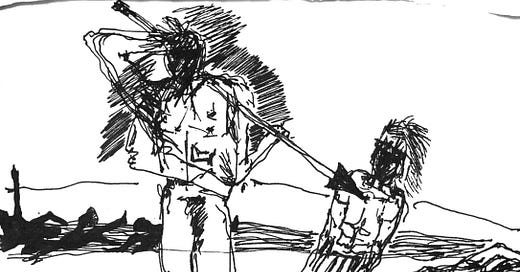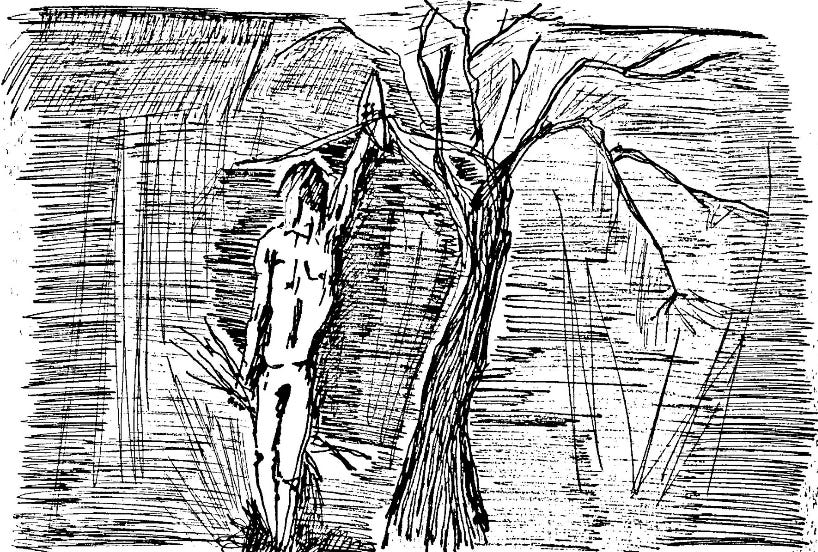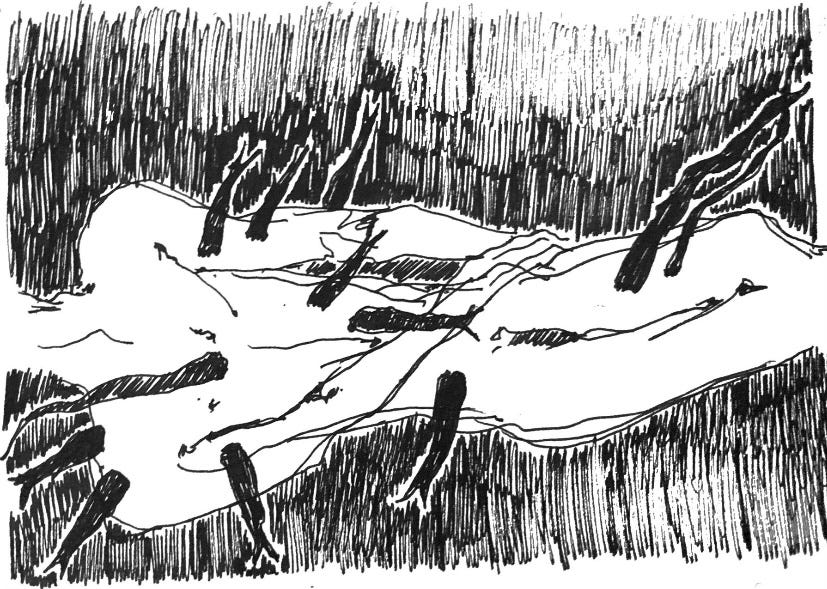Remember last week when I was sitting on the library floor parsing the interlinear Greek for a paper on the Iliad? And writing poems (which I never do) to figure out what Homer might be saying? I just loved reading Auden’s “Shield of Achilles” and its thrumming meter and stark rhyme remained in my ear while I finished the Iliad. So I tried my hand at writing something Auden-like—that is, with a strict but not prescriptive attention to meter and rhyme, sound’s substantial contribution to meaning. It’s got these great alternating lines of perfect iambic pentameter, then these jolting trochaic starts, fluttering consonants, long drawn-out syllables. The consciously inconsistent rhyme scheme charges the emotional voltas in each stanza. Obviously one can’t be Auden! But there is something really fun about teaching myself formal poetry by just trying to hear what he was doing.
I wrote my ersatz Auden poem about Lykaon, whose death I strangely found the most affecting of all upon this reading (my second time around). In Book XXI, not too far from the end of the epic, we get Lykaon’s backstory. I’d argue he’s the most important of the so-called “peripheral” characters in the Iliad—his death sequence takes up more than a hundred lines, and it’s some of the most heightened and intricate poetry we get in Homer. He’s a prince of Troy, son of Priam, a half-brother to mighty Hektor and perfumed Paris.
The story goes that Achilles abducted him on a night raid from the palace orchard where he’d been stripping branches to build a chariot. He doesn’t kill Lykaon, for some reason that isn’t really explained, and then sells him (mercifully, from Achilles’ view) into slavery. Lykaon has connections, though, and soon he’s back at Troy—they give him twelve days to recover from his suffering, and then put him back on the front line. Achilles catches sight of him, and grows pallid to see a man he thinks he’s already defeated.
But the old Achilles, the Achilles who still had an ounce of pity, is gone. He died with Patroclus. The way Achilles interprets Patroclus’ death makes him smaller and shabbier. The awful killing has made him less interesting and able, just a vessel for heedless revenge. So when Achilles meets Lykaon again, there will be no mercy.
Lykaon (In the Style of W.H. Auden’s “Shield of Achilles”)
The fast-foot overtook the prince
Out the walls, under the bough
With half a mind
To gut him like a sow.
As he stripped the flexuous fig
For yielding branches to adorn his rig,
The boy born of rock and salt
Roped and broke him like a colt.
The warrior lowered above his head,
About to slit the tender throat,
But halted the bronze and did not gloat,
For looking down he saw instead
A fellow prince to share his bread,
To rest on furs and sacrifice a goat—
Only after to settle the price
And put him on the boat.
So when the fast-foot saw him straggling out the river,
The same prince, though wan and a little thinner,
His body shook with an involuntary shiver.
He’d tried to ship him off, evade the Spinners.
But some rich uncle exchanged him for cattle
And twelve days later he marched back to battle.
To grasp his knees and stroke his brow
Couldn’t turn the fast-foot now.
The gentle one was gone,
And his mercy with him.
“If only he’d stayed at Lemnos,
I wouldn’t have to kill ’em.”
No longer a man to heed a father’s wishes,
He cast the prince headlong from the bank—
A blood-price, paid to the fishes.
P.S. I took my work with me to the mountain: I tried memorizing Achilles’ long speech in Book XXI as I was backpacking with friends across an unforgivingly craggy pass on my way to one of the driest spots in the U.S. Not my usual style! But after being scholarly and sedentary for so long, it felt good to be physically exhausted. To this pitiless speech, which unstrings Lykaon with words alone, click here. To hear me read aloud Auden’s great poem, check out this old post from last summer when I was reading the Iliad for the first time—how young and green I was! To hear my poetic knock-off, “Lykaon,” read aloud, click below.
P.P.S. I also finished the Book of Genesis on this camping trip. The desert setting was a little on the nose for my taste. It was just too pointedly Abrahamic that we were carrying our firewood on our backs. (Only brush where we were headed.) Like Isaac, I kept thinking, where’s the goat?
P.P.P.S. A note on beginnings and endings, while we’re talking Homer and Bible: Genesis opens with “In the beginning” and ends “in a coffin in Egypt.” The Iliad begins with the origin of the quarrel between the gods and ends with “the funeral of Hektor, breaker of horses.” So cool!











